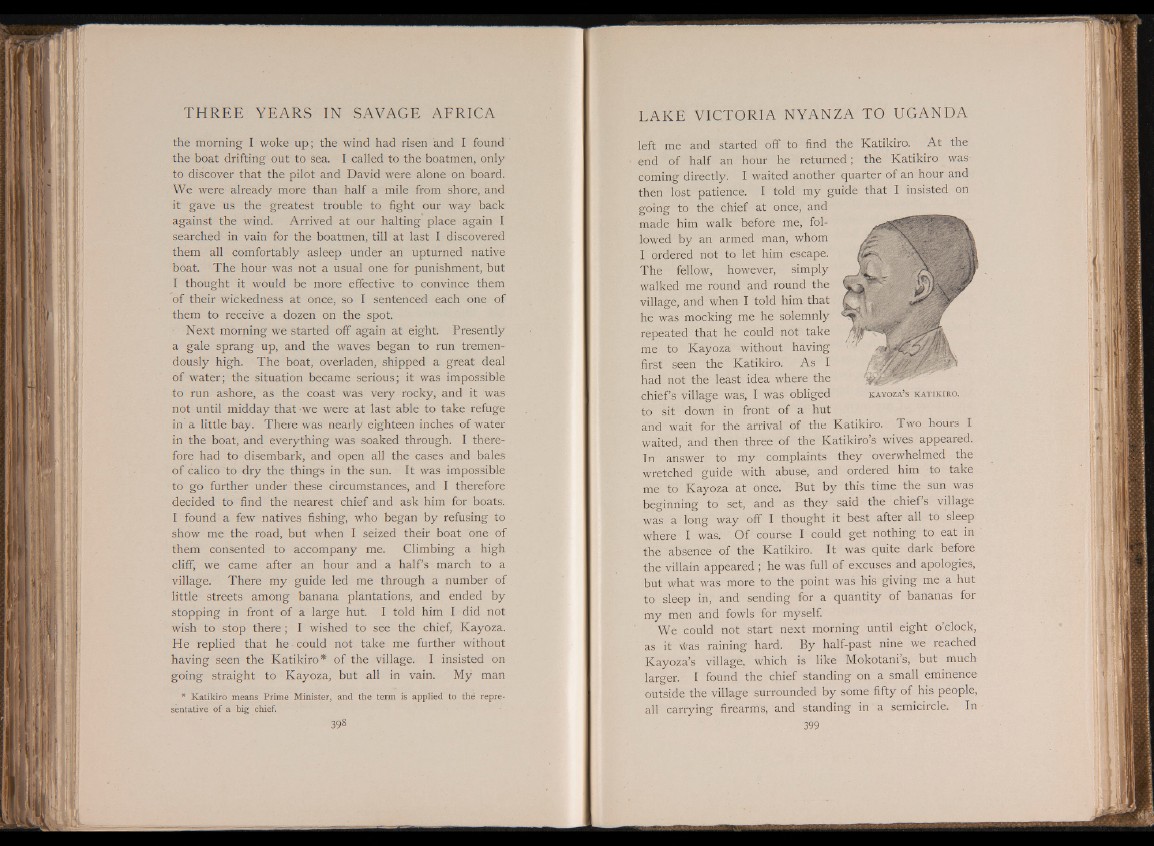
the morning I woke up; the wind had risen and I found
the boat drifting out to sea. I called to the boatmen, only
to discover that the pilot and David were alone on board.
We were already more than half a mile from shore, and
it gave us the greatest trouble to fight our way back
against the wind. Arrived at our halting place again I
searched in vain for the boatmen, till at last I discovered
them all comfortably asleep under an upturned native
boat. The hour was not a usual one for punishment, but
I thought it would be more effective to convince them
of their wickedness at once, so I sentenced each one of
them to receive a dozen on the spot.
Next morning we started off again at eight. Presently
a gale sprang up, and the waves began to run tremendously
high. The boat, overladen, shipped a great deal
of water; the situation became serious; it was impossible
to run ashore, as the coast was very rocky, and it was
not until midday that we were at last able to take refuge
in a little bay. There was nearly eighteen inches of water
in the boat, and everything was soaked through. I therefore
had to disembark, and open all the cases and bales
of calico to dry the things in the sun. It was impossible
to go further under these circumstances, and I therefore
decided to find the nearest chief and ask him for boats.
I found a few natives fishing, who began by refusing to
show me the road, but when I seized their boat one of
them consented to accompany me. Climbing a high
cliff, we came after an hour and a half’s march to a
village. There my guide led me through a number of
little streets among banana plantations, and ended by
stopping in front of a large hut. I told him I did not
wish to stop there ; I wished to see the chief, Kayoza.
He replied that he could not take me further without
having seen the Katikiro* of the village. I insisted on
going straight to Kayoza, but all in vain. My man
* Katikiro means Prime Minister, and the term is applied to the representative
of a big chief.
left me and started off to find the Katikiro. At the
end of half an hour he returned; the Katikiro was
coming directly. I waited another quarter of an hour and
then lost patience. I told my guide that I insisted on
going to the chief at once, and
made him walk before me, followed
by an armed man, whom
I ordered not to let him escape.
The fellow, however, simply
walked me round and round the
village, and when I told him that
he was mocking me he solemnly
repeated that he could not take
me to Kayoza without having
first seen the Katikiro. As I
had not the least idea where the
chief’s village was, I was obliged
to sit down in front of a hut
and wait for the arrival of the Katikiro. Two hours I
waited, and then three of the Katikiro’s wives appeared.
In answer to my complaints they overwhelmed the
wretched guide with abuse, and ordered him to take
me to Kayoza at once. But by this time the sun was
beginning to set, and as they said the chief’s village
was a long way off I thought it best after all to sleep
where I was. Of course I could get nothing to eat in
the absence of the Katikiro. It was quite dark before
the villain appeared ; he was full of excuses and apologies,
but what was more to the point was his giving me a hut
to sleep in, and sending for a quantity of bananas for
my men and fowls for myself.
We could not start next morning until eight o’clock,
as it Was raining hard. By half-past nine we reached
Kayoza’s village, which is like Mokotani’s, but much
larger. I found the chief standing on a small eminence
outside the village surrounded by some fifty of his people,
all carrying firearms, and standing in a semicircle. In
399
T * Wm ÿL
k a y o z a ’ s k a t i k i r o .